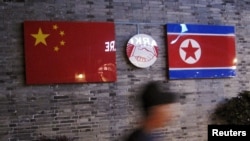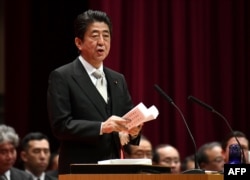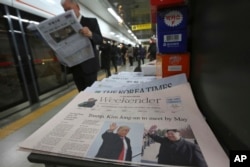China says North Korean leader Kim Jong Un confirmed during a secretive visit to Beijing his commitment to denuclearize the Korean peninsula and engage in talks with South Korea and the United States.
Nuclear commitment
China's official Xinhua news agency, which posted photos of the North Korean leader with Chinese President Xi Jinping, reported that Kim and his wife Ri Sol Ju paid an unofficial visit to Beijing from Sunday to Wednesday, and attended a banquet in the Great Hall of the People with Xi and his wife Peng Liyuan.
During their meeting the two leaders reiterated the importance of maintaining the close China-North Korea alliance that had grown tense over Pyongyang’s defiant nuclear and ballistic missile tests. Xi supported increasingly harsh U.S. led sanctions to pressure Kim to reenter talks to end his threatening nuclear program in exchange for ending economic restrictions, increasing assistance, and providing security guarantees.
WATCH: Korea talks
In the last few months, Kim moderated his previous non-negotiable position that North Korea is now a nuclear weapons state. Instead he moved to reduce tensions by suspending further nuclear and missile tests, participating in the recent Olympics in South Korea, and offering to engage in nuclear talks with South Korean President Moon-Jae-in that is being planned for April, and with U.S. President Donald Trump that is expected to be held in May.
Kim told XI he is prepared to resolve "the issue of the denuclearization" as long as South Korea and the United States “respond to our efforts with goodwill, create an atmosphere of peace and stability, while taking progressive and synchronous measures for the realization of peace," according to Xinhua.
The North's official Korean Central News Agency (KCNA) on Wednesday reported on Kim’s visit to China, but did not mention his promise to denuclearize, or the upcoming summits.
Positive reactions
On Tuesday President Xi briefed President Trump on Kim’s visit to Beijing. Afterwards the White House released a statement saying, “We see this development as further evidence that our campaign of maximum pressure is creating the appropriate atmosphere for dialogue with North Korea.”
On Twitter Wednesday, Trump said Xi told him thet talks with Kim went well.
South Korean officials welcomed Kim’s pledge to denuclearize and China’s efforts to facilitate the negotiation process.
"The improvement and development of the relations between North Korea and China will be helpful in solving the problem of the Korean peninsula such as denuclearization and the peace settlement," said Baik Tae-hyun, the spokesman for the Ministry of Unification.
Japanese Prime Minister Shinzo Abe said his government is monitoring the improving China-North Korea relationship with "extreme interest" but wants more than denuclearization promises before considering easing sanctions.
"Unless we see concrete action (from North Korea) we will not lift the embargo. Furthermore we will be working in full unity with the international community," said Abe.
Motivating factors
Analysts question whether the North Korean leader is actually committed to give up his nuclear and missile program after investing in intensive development tests to increase his nuclear arsenal’s capabilities and range, which include targeting the U.S. mainland with a long range nuclear missile.
Even if Pyongyang agrees to give up its nuclear arsenal, the process of outside verification and dismantlement could take a decade and it would not be difficult for the Kim government to conceal some of it nuclear weapons.
"Maybe our assessment is that he has 30 nuclear weapons and he agrees to declare 28. So there are two that he didn’t declare and it is sort of out there. How do we verify that, we just don’t know?" asked Frank Aum, the Senior Expert on North Korea at the United States Institute of Peace during a recent nuclear conference in Seoul.
Kim may be motivated in part to both engage in talks and to seek Chinese help to pursue relief from Trump’s maximum pressure campaign that brought about international sanctions banning billions of dollars of North Korean coal, seafood and clothing.
"I think that these sanctions are beginning to bite and North Korea does want to have these sanctions lifted. China can play a role in that regard," said Bonnie Glaser, an Asia expert at the Center for Strategic and International Studies in Washington.
President Moon’s proactive outreach may have also played a role in reassuring the leadership in Pyongyang that the South does not seek the collapse of the Kim government, but wants to increase cooperation and economic ties over time, once the issue of denuclearization is resolved.
On Thursday, a high-level North/South preparatory session for the inter-Korean summit will be held. Also on Thursday, Chinese diplomat Yang Jiechi, will brief officials in Seoul, including President Moon, on Kim’s visit to Beijing.
Lee Yoon-jee in Seoul contributed to this report.











